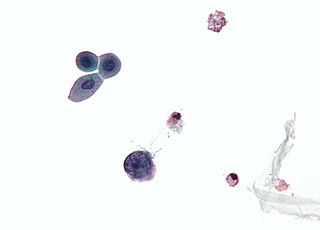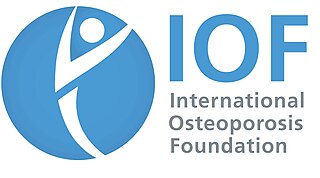Related Research Articles

A respiratory therapist is a specialized healthcare practitioner trained in critical care and cardio-pulmonary medicine in order to work therapeutically with people who have acute critical conditions, cardiac and pulmonary disease. Respiratory therapists graduate from a college or university with a degree in respiratory therapy and have passed a national board certifying examination. The NBRC is responsible for credentialing as a CRT, or RRT,

Immunosuppression is a reduction of the activation or efficacy of the immune system. Some portions of the immune system itself have immunosuppressive effects on other parts of the immune system, and immunosuppression may occur as an adverse reaction to treatment of other conditions.

Severe combined immunodeficiency (SCID), also known as Swiss-type agammaglobulinemia, is a rare genetic disorder characterized by the disturbed development of functional T cells and B cells caused by numerous genetic mutations that result in differing clinical presentations. SCID involves defective antibody response due to either direct involvement with B lymphocytes or through improper B lymphocyte activation due to non-functional T-helper cells. Consequently, both "arms" of the adaptive immune system are impaired due to a defect in one of several possible genes. SCID is the most severe form of primary immunodeficiencies, and there are now at least nine different known genes in which mutations lead to a form of SCID. It is also known as the bubble boy disease and bubble baby disease because its victims are extremely vulnerable to infectious diseases and some of them, such as David Vetter, have become famous for living in a sterile environment. SCID is the result of an immune system so highly compromised that it is considered almost absent.

Pharmacy is the science and practice of discovering, producing, preparing, dispensing, reviewing and monitoring medications, aiming to ensure the safe, effective, and affordable use of medicines. It is a miscellaneous science as it links health sciences with pharmaceutical sciences and natural sciences. The professional practice is becoming more clinically oriented as most of the drugs are now manufactured by pharmaceutical industries. Based on the setting, pharmacy practice is either classified as community or institutional pharmacy. Providing direct patient care in the community of institutional pharmacies is considered clinical pharmacy.
Immunodeficiency, also known as immunocompromisation, is a state in which the immune system's ability to fight infectious diseases and cancer is compromised or entirely absent. Most cases are acquired ("secondary") due to extrinsic factors that affect the patient's immune system. Examples of these extrinsic factors include HIV infection and environmental factors, such as nutrition. Immunocompromisation may also be due to genetic diseases/flaws such as SCID.
Metachromatic leukodystrophy (MLD) is a lysosomal storage disease which is commonly listed in the family of leukodystrophies as well as among the sphingolipidoses as it affects the metabolism of sphingolipids. Leukodystrophies affect the growth and/or development of myelin, the fatty covering which acts as an insulator around nerve fibers throughout the central and peripheral nervous systems. MLD involves cerebroside sulfate accumulation. Metachromatic leukodystrophy, like most enzyme deficiencies, has an autosomal recessive inheritance pattern.

Cell therapy is a therapy in which viable cells are injected, grafted or implanted into a patient in order to effectuate a medicinal effect, for example, by transplanting T-cells capable of fighting cancer cells via cell-mediated immunity in the course of immunotherapy, or grafting stem cells to regenerate diseased tissues.
Hypogammaglobulinemia is an immune system disorder in which not enough gamma globulins are produced in the blood. This results in a lower antibody count, which impairs the immune system, increasing risk of infection. Hypogammaglobulinemia may result from a variety of primary genetic immune system defects, such as common variable immunodeficiency, or it may be caused by secondary effects such as medication, blood cancer, or poor nutrition, or loss of gamma globulins in urine, as in nonselective glomerular proteinuria. Patients with hypogammaglobulinemia have reduced immune function; important considerations include avoiding use of live vaccines, and take precautionary measures when traveling to regions with endemic disease or poor sanitation such as receiving immunizations, taking antibiotics abroad, drinking only safe or boiled water, arranging appropriate medical cover in advance of travel, and ensuring continuation of any immunoglobulin infusions needed.
Primary immunodeficiencies are disorders in which part of the body's immune system is missing or does not function normally. To be considered a primary immunodeficiency (PID), the immune deficiency must be inborn, not caused by secondary factors such as other disease, drug treatment, or environmental exposure to toxins. Most primary immunodeficiencies are genetic disorders; the majority are diagnosed in children under the age of one, although milder forms may not be recognized until adulthood. While there are over 430 recognized inborn errors of immunity (IEIs) as of 2019, the vast majority of which are PIDs, most are very rare. About 1 in 500 people in the United States are born with a primary immunodeficiency. Immune deficiencies can result in persistent or recurring infections, auto-inflammatory disorders, tumors, and disorders of various organs. There are currently limited treatments available for these conditions; most are specific to a particular type of PID. Research is currently evaluating the use of stem cell transplants (HSCT) and experimental gene therapies as avenues for treatment in limited subsets of PIDs.
The American Society of Transplantation (AST) is an international organization of over 4,000 transplant professionals dedicated to advancing the field of transplantation through the promotion of research, education, advocacy, organ donation, and service to the community through a lens of equity and inclusion. It is the largest professional transplantation society in North America.
The American Orthopaedic Society for Sports Medicine (AOSSM) promotes sports medicine education, research, communication, and fellowship and includes national and international orthopaedic sports medicine leaders. The Society works closely with many other sports medicine specialists, including athletic trainers, physical therapists, family physicians, and others to improve the identification, prevention, treatment, and rehabilitation of sports injuries. Formed in 1972 as a forum for education and research with 100 members, the AOSSM today has to more than 2,000 members.

The King Hussein Cancer Foundation (KHCF) and Center (KHCC) ,an independent Jordanian non-governmental, non-profit institution. It was established in 2001 by a royal decree issued and is led by Princess Ghida Talal. The Foundation's mission is to combat cancer through awareness, prevention, and early detection programs, providing comprehensive care for cancer patients from Jordan and the Arab world, in addition to promoting research and innovation.
Hans Dieter Ochs, is an immunologist and pediatrician. He is Professor of Pediatrics, Division of Immunology, Department of Pediatrics, University of Washington School of Medicine, Seattle.

The International Osteoporosis Foundation (IOF), headquartered in Nyon, Switzerland, is a non-governmental organization (NGO) founded in 1998. It was formed from the merger of the European Foundation for Osteoporosis, founded in 1987, and the International Federation of Societies on Skeletal Diseases. The foundation functions as a global alliance of individuals and organizations concerned with the prevention, diagnosis and treatment of osteoporosis and musculoskeletal bone disease. The goal of the Foundation is to increase the early detection of osteoporosis and related musculoskeletal diseases, as well as to improve the treatment of these conditions through international collaboration among national healthcare systems and governments. The Foundation is the largest global NGO dedicated to osteoporosis and musculoskeletal diseases.
Arthur J. Ammann was an American pediatric immunologist and advocate known for his research on HIV transmission, discovering in utero transmission and the risk of contaminated transfusions and blood products, and his role in the development of the first successful vaccine to prevent pneumococcal infection in 1977. He founded Global Strategies for HIV Prevention and was Clinical Professor of Pediatrics at the UCSF Medical Center.
High-dose chemotherapy and bone marrow transplant (HDC/BMT), also high-dose chemotherapy with autologous bone marrow transplant, was an ineffective treatment regimen for metastatic breast cancer, and later high-risk breast cancer, that was considered promising during the 1980s and 1990s. With an overall idea that more is better, this process involved taking cells from the person's bone marrow to store in a lab, then to give such high doses of chemotherapy drugs that the remaining bone marrow was destroyed, and then to inject the cells taken earlier back into the body as replacement. It was ultimately determined to be no more effective than normal treatment, and to have significantly higher side effects, including treatment-related death.

Asghar Aghamohammadi was an Iranian (Persian) medical scientist, Immunologist and Immunology professor at the Tehran University of Medical Sciences. Aghamohammadi had studied in many institutes, including the Ahvaz Jundishapur University of Medical Sciences, Tehran University of Medical Sciences, Great Ormond Street Hospital and the University of Toyama. He had been one of the most distinguished Iranian Immunologists and awarded many national scientific prizes for his works, mostly in the field of primary immunodeficiency. Aghamohammadi is recognized internationally by hundreds of publications in this field and was the most important contributor to awareness of primary immunodeficiencies and to the management of immunodeficient patients in Iran. He had even been regarded as one of the most notable Iranian people in some lists.

The Binaytara Foundation (BTF) was established in 2007 by Dr. Binay Shah and wife Tara Shah with the goal of promoting health and education in underprivileged societies. The BTF is a Washington State nonprofit organization exempt from taxation pursuant to Section 501(c)(3) of the Internal Revenue Code. BTF has founded multiple programs in underdeveloped and developing countries to improve access to healthcare. Recent accomplishments include building a 25-bed cancer hospital in Nepal in 2018 and breaking ground on their new 200-bed facility in 2022.
The Polish Society of Nephrology is a non-profit medical-scientific association, established in 1983, with a current headquarters in Warsaw that unites nephrologists, physicians and other scholars, experts and professionals in the fields of kidney diseases, dialysis therapy and renal transplantation.

Marina Cavazzana is a professor of Paediatric Immunology at the Necker-Enfants Malades Hospital and the Imagine Institute, as well as an academic at Paris Descartes University. She was awarded the Irène Joliot-Curie Prize in 2012 and elected to the National Academy of Medicine in 2019.
References
- ↑ ESID Constitution Archived 2011-10-02 at the Wayback Machine , ESID
- ↑ About INGID Archived 2010-07-29 at the Wayback Machine , INGID
- ↑ Events Archived 2011-03-07 at the Wayback Machine , IPOPI
- ↑ XVth Biennial Meeting of the European Society for Primary Immunodeficiencies Archived 2011-10-02 at the Wayback Machine , ESID
- ↑ 15th Biennial Meeting Archived 2011-03-14 at the Wayback Machine , Kenes International
- ↑ Scientific Meetings Archived 2011-10-02 at the Wayback Machine , ESID
- 1 2 PID Care in Development Archived 2011-05-03 at the Wayback Machine , ESID
- ↑ Bone Marrow Transplantation & Gene Therapy Archived 2011-05-03 at the Wayback Machine , ESID
- ↑ Clinical Archived 2011-05-13 at the Wayback Machine , ESID
- ↑ Educational Archived 2011-05-05 at the Wayback Machine , ESID
- ↑ Genetics Archived 2011-05-03 at the Wayback Machine , ESID
- ↑ ESID Juniors Archived 2011-05-03 at the Wayback Machine , ESPID
- 1 2 Education Archived 2011-05-05 at the Wayback Machine , ESID
- ↑ Registry Archived 2010-12-05 at the Wayback Machine , ESID